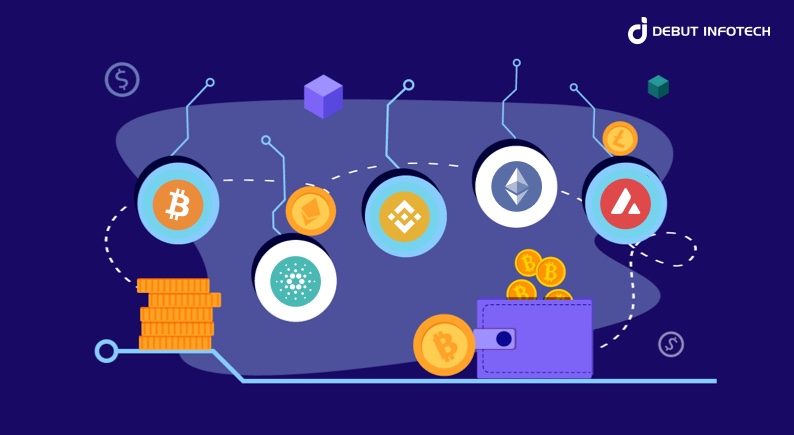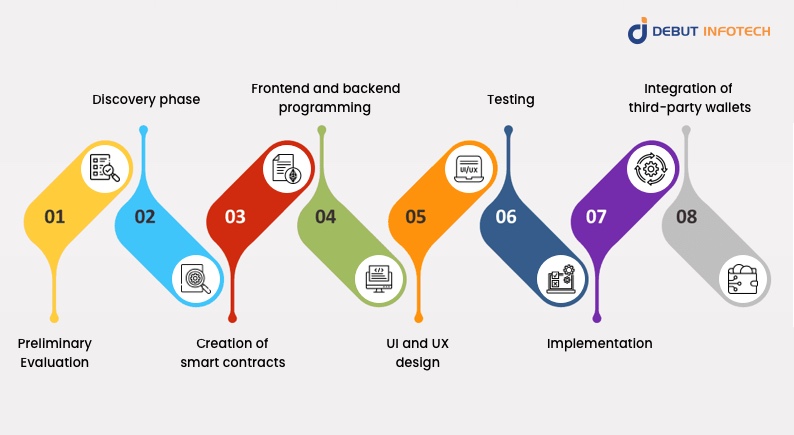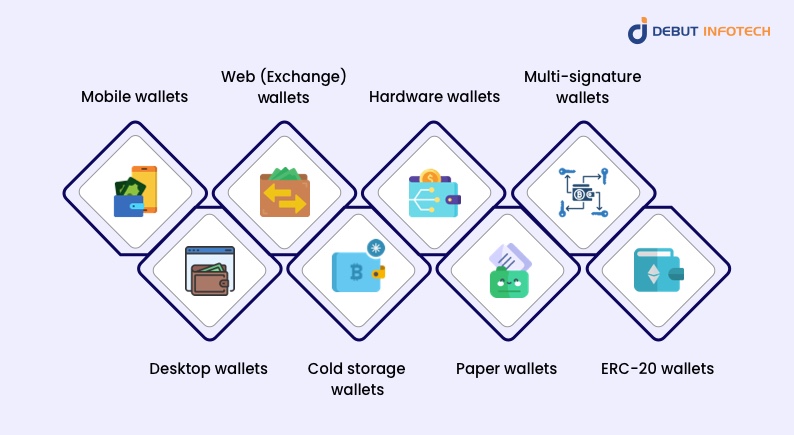Table of Contents
Home / Blog /
Blockchain Cryptocurrency Wallet Development Services
May 2, 2024

May 2, 2024
The market for cryptocurrency wallets was valued at USD 8052.98 million in 2022 and is expected to grow at a compound annual growth rate of 30.76% to reach USD 40244.7 million by 2028. This implies that companies and investors can increase their income with renowned crypto wallet development teams and profit from their investments by taking advantage of this Million-Dollar segment. Selecting the best blockchain consulting company can be difficult, mainly when multiple options are available. This is where Debut Infotech comes in. As a top blockchain app development company, we aim to streamline the wallet launch process.
What is A Crypto Wallet?
A crypto wallet is a device that securely stores and manages your private keys, which are the alphanumeric characters required to authorize transactions. Unlike a traditional wallet, which would cram your cryptocurrency next to expired coupons and old receipts, a crypto wallet functions more like an intelligent key chain that manages the keys required to move funds from one locked box to another.
This is made possible by advancements in user-interface technology, which eliminates the need to see each key. Additionally, a crypto mobile wallet typically offers a user-friendly platform that streamlines the transaction process. For example, a crypto wallet might let you store cryptocurrencies from various blockchain networks.
Every time a user performs a transaction, the wallet connects to that blockchain to perform the necessary operation. You then receive a notification from the wallet asking you to sign a message to confirm the transaction.
In addition to storing your private keys, new smart contract crypto wallets give you access to the Web3 economy and decentralized applications (dapps), enabling you to participate in the emerging digital world.
Using a cryptocurrency wallet gives people financial freedom and links them with the underlying concept of cryptocurrencies.
Why Use A Cryptocurrency Wallet?

Users of a cryptocurrency wallet can act as their own bank. They have an exceptional chance to safely retain a part of their wealth independent of a third-party custodian, like a bank or centralized exchange.
Cryptocurrency exchanges have a history of losing billions of dollars due to inadequate security features or improper handling of deposited monies. Investing using a cryptocurrency wallet shields one from such disasters. It deprives centralized platforms of their ability to rehypothecate user funds and manipulate asset values.
Remarkably, financial independence entails a great deal of personal accountability. Investors who opt for self-custody need to become proficient at preventing asset loss.
How Does A Cryptocurrency Wallet Work?
An individual’s pass to interact with the underlying blockchain is their cryptocurrency wallet. A cryptocurrency wallet usually creates a unique public key, which is used for transactions, and a private key, which is like a secret bank pin for first-time users.
Real currencies or assets are not kept in a crypto wallet. Rather, it keeps the user’s address(es) private and public keys on the blockchain. To transfer assets from one address to another, users can use the wallet to sign transactions using their private key.
A cryptocurrency wallet also offers front-end tools for efficiently managing crypto assets. Consumers can use a fiat gateway to buy/sell cryptocurrencies, create new addresses, start transfers, and keep track of their portfolio balances.
The Crypto Wallet Development Process

To ensure functionality, security, and user experience, creating a cryptocurrency wallet requires several tactical and technical decisions. Developing a dependable and user-friendly cryptocurrency wallet solution requires careful consideration of every stage, from defining the wallet’s purpose and security requirements to choosing the right technological stack and carrying out extensive testing. Some of the significant processes are listed below:
Preliminary Evaluation
The initial assessment phase is crucial because it provides an understanding of the project, how a wallet will be used, and whether a proprietary solution is required in that particular situation. We meet with the customer to obtain the required data and lay out a plan of action.
Discovery phase
If a proprietary solution is the best option for the project, we move on to the Discovery and Architecture phase. Here, our objectives are to gain a solid understanding of the solution, determine what special features and functionalities will be needed, and determine how all of that fits into the overall project—a DeFi dApp, exchange or marketplace, gaming dApp, etc.
During this stage, we also create the best possible solution architecture. This establishes key components of the solutions, including the backend-frontend relationship, wallet creation, transaction execution, and data storage and retrieval.
Creation of smart contracts
Any unique features and functions that a proprietary solution might require are powered by smart contracts. These could have attributes like support for NFT, transfer limitations, bundle transactions, smart recovery, and many more. With over 160 smart contracts successfully deployed to the mainnet, the Debut Infotech team has demonstrated its prowess in creating smart contracts. View our portfolio for proof! We also collaborate with top smart contract auditing companies to ensure our contracts are flawlessly optimized and devoid of bugs because we take smart contract security very seriously.
Frontend and backend programming
This is where the product’s main body eventually takes shape. The backend infrastructure manages the frontend and blockchain interfaces, as well as the smart contract execution. The front end manages user interaction with the solution.
UI and UX design
Regarding user interactions, our Web3 UX and UI design team is committed to creating a seamless user experience and a user-friendly interface for the wallet. The team collaborates closely with the frontend developers to guarantee that their designs have an appropriate appearance and feel, the proper informational structure and all the required user flows.
Testing
We put the wallet through a comprehensive testing process before release to ensure that it is free of defects or potential exploits and that it functions as planned.
Implementation
Now that everything has been completed, the product is all set for launch.
Integration of third-party wallets
If creating a proprietary wallet is not necessary for your project, we can assist you with integrating an appropriate third-party solution.
Crypto Wallet Development Services Security Measures
When developing cryptocurrency wallets, security is our first priority. We can create highly secure and bug-free cryptocurrency wallets since we are skilled in a variety of security techniques.
- Anti-DDoS hardware and software modules for mitigating distributed denial-of-service attacks that stop malicious access requests
- For extra protection, we use two or more distinct verification methods while logging in.
- Examine the procedure for creating event logs on computers to identify security risks proactively.
- Data is transformed into an unreadable format via encryption methods such as Advanced Encryption Standard (AES).
- Encryption of all data and messages transmitted in cryptocurrency transactions.
- Sophisticated malware and URL defence to stop phishing attempts.
- Defence against phishing schemes, social engineering, and fraudulent wallet applications.
- Need several keys to initiate, approve, and carry out a transaction.
- The safe creation, storage, and application of cryptographic keys.
- Effective administration of cryptographic keys during their whole lifecycle.
- Data is transmitted and encrypted between a browser and a website.
- A passcode for everyone attempting to take out money.
Types Of Cryptocurrency Wallets

Wallets come in two primary varieties: custodial and noncustodial. Custodial wallets are managed by an outside organization that keeps your keys safe. This company might offer enterprise-level data security solutions, which companies use to protect and preserve their data. Certain cryptocurrency exchanges provide custodial wallets for their users. When using a noncustodial wallet, you are in charge of keeping your keys safe. The majority of cryptocurrency wallets on devices are of this sort.
Wallets are further divided into two subcategories: hot and cold. A cold wallet is disconnected from the Internet, whereas a hot wallet is connected to the Internet or another device. Finally, wallets can be divided into three subcategories: paper, hardware, and software.
These kinds of wallets are classified as either hot or cool. It is possible to have a custodial hardware cold wallet, a noncustodial hardware hot wallet, or a noncustodial software hot wallet. These are the most typical kinds. However, there might be other combinations as well.
Before choosing one, users must weigh the pros and downsides of each type of crypto wallet and determine what they need.
Mobile wallets
Mobile wallets are usually offered as free apps for iOS or Android smartphones. Users can install mobile wallets from their local app stores within minutes. Trust Wallet, Coinbase Wallet, Coinomi, and Metamask Mobile are a few well-liked mobile wallet choices.
For cryptocurrency investors, mobile wallets provide some of the greatest user experiences. In addition to shopping online and occasionally interacting with decentralized applications, users can send and receive cryptocurrency.
Desktop wallets
Windows, Linux, macOS, and other desktop-based operating systems all have native programs for desktop wallets. Most desktop wallets generate a private key file, which users can safely keep and utilize to retrieve funds in the event that the device malfunctions. A few desktop cryptocurrency wallets are Bitcoin Core, Exodus, Electrum, Atomic Wallet, and Coinomi.
Web (Exchange) wallets
A web wallet is a browser extension, frequently called a Web3 wallet. It can be used to exchange cryptocurrency or to interact with and transact on decentralized applications (dapps), including those found in games and decentralized finance (DeFi).
Most web wallets are also free to use, and the better ones let you connect to popular blockchains like Ethereum, Polygon, Solana, BNB Chain, and more. Examples of well-known web wallets are Metamask, Trust Wallet, Phantom, and Coinbase Wallet.
Cold storage wallets
A cold storage wallet is any hardware wallet that has been configured for only a few uses. Long-term cryptoasset storage is usually accomplished with cold storage wallets, where the offline storage of the private key reduces the possibility of losing money to online hackers.
Hardware wallets
Hardware wallets are physical items with specially designed chips to hold cryptographic keys. Most hardware wallets keep private keys offline to sign transactions in this mode. Subsequently, the transaction data is uploaded to the blockchain online using an encrypted connection.
The two most well-liked hardware wallet brands among cryptocurrency investors are Ledger and Trezor. Modern gadgets like the Ngrave Zero and Casa also have features that have increased their market appeal.
Paper wallets
A paper wallet is a sheet of paper with your private and public key addresses inscribed. Users can safely keep the paper and move coins to the wallet address that is produced. The assets can be retrieved by moving the coins to a different address and recovering the private key on a desktop or mobile wallet.
The consensus is that using paper wallets to hold cryptocurrency is out of date. They are useful, nonetheless, in specific scenarios, including presenting cryptocurrency as a gift or putting up a temporary cold storage system.
Multi-signature wallets
As the name implies, a multi-signature wallet needs several cryptographic signatures to approve a transaction. It permits shared ownership and adds another line of defence against possible theft.
Using desktop wallets like Electrum and Atomic Wallet, you can secure your cryptocurrency holdings with multiple signatures. Casa and BitPay also offer multi-signature functionality for mobile wallets.
ERC-20 wallets
The protocol used to create fungible tokens on the Ethereum blockchain is called Ethereum Request for Comment 20 (ERC-20). Users can handle ERC-20 tokens and ether (ETH), the native currency of the Ethereum network, using wallets that are compatible with ERC-20.
Most popular desktop and mobile wallets are compatible with ERC-20. Nonetheless, Metamask, MyEtherWallet, and Coinbase Wallet are the top ERC-20 wallets.
Why Debut Infotech Is Your Partner For The Best Cryptocurrency Wallet Development
Debut Infotech is one of the leading crypto wallet enterprise blockchain app development companies offering end-to-end crypto wallet development services as well as blockchain consulting services at an affordable cost. We develop crypto wallets that support unlimited cryptocurrencies, stablecoins, tokens, NFTs, etc. Our crypto wallet developers have rich expertise in cutting-edge blockchain technologies and can cater to various business requirements, no matter what sector they are in. Our team can handle even the most challenging crypto projects at ease, and we always explore new avenues to provide our clients with the best possible experience.
Hire our dedicated crypto wallet developers, who guarantee our custom wallet solutions meet your crypto business expectations. We offer a White Label Crypto Wallet for customers looking for an instant wallet launch. It is a prebuilt, custom blockchain solution that is multi-tested to ensure hassle-free usage and is tamper-proof.
Our priority is always to please our customers, and we provide 24/7 support for 100 percent client satisfaction. Our experts believe in answering as many questions as possible that a client may have. Contact us and learn more about how our developers can launch your cryptocurrency wallet with the greatest technologies!
Frequently Asked Questions: Cryptocurrency Wallet Development
A. Developing software for users to store, send, and receive digital money safely is known as cryptocurrency wallet development. These wallets offer a user interface for holdings management and handle the cryptographic keys connected to cryptocurrencies.
A. To develop a robust wallet solution, delineate the functional requirements and security prerequisites, select the wallet type (hardware, web, or mobile), opt for appropriate cryptography libraries and technological stack, implement transaction processing, key management, and user interface components, enforce stringent security measures like multi-factor authentication and encryption, conduct thorough testing across platforms and scenarios, and ensure ongoing updates and support for the wallet’s users.
A. Development costs might vary significantly depending on a crypto wallet’s features, security protocols, and complexity. Simple wallets could cost between $20,000 and $50,000, while more sophisticated options—particularly ones that need to integrate with numerous cryptocurrencies or have strong security features—can cost more than $100,000.
A. There are two common approaches to developing cryptocurrency wallets. One option is to start from scratch and create the wallet, which is costly and time-consuming. Alternatively, you can create wallets more quickly and cheaply using white-label software.
A. Mobile wallets incorporate several technologies, including blockchain for cryptographic key management and secure transactions, Secure Element (SE) chips for hosting secure applications, Near-Field Communication (NFC) for contactless payments, Quick Response (QR) codes for transaction initiation and strong encryption and security protocols to protect sensitive data and transactions.
A. Selecting Debut Infotech as your crypto wallet development partner offers several benefits. Because of Debut Infotech’s proficiency with software development and blockchain technology, a reliable and secure wallet solution can be guaranteed. Its knowledge of user requirements and industry experience can produce a feature-rich and easy-to-use wallet.
A. Developing a cryptocurrency wallet using white-label software takes two to three weeks. On the other hand, creating a crypto wallet from scratch could take up to a year.
Talk With Our Expert
USA
2102 Linden LN, Palatine, IL 60067
+1-708-515-4004
info@debutinfotech.com
UK
Debut Infotech Pvt Ltd
7 Pound Close, Yarnton, Oxfordshire, OX51QG
+44-770-304-0079
info@debutinfotech.com
Canada
Debut Infotech Pvt Ltd
326 Parkvale Drive, Kitchener, ON N2R1Y7
+1-708-515-4004
info@debutinfotech.com
INDIA
Debut Infotech Pvt Ltd
Sector 101-A, Plot No: I-42, IT City Rd, JLPL Industrial Area, Mohali, PB 140306
9888402396
info@debutinfotech.com




Leave a Comment